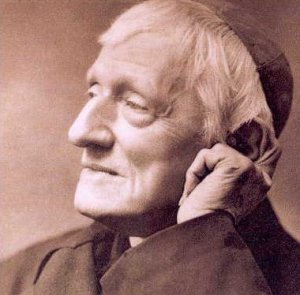
On March 1st, Dr. Don Briel, director of the Center for Catholic Studies and avid Newman scholar, gave a lecture titled “Why Newman Matters,” the first of a series of lectures on Faith and Culture. Although he acknowledged a variety of possible reasons for the importance of John Henry Newman, Briel chose to speak about Newman as an educator who had profound insights into the nature and end of higher education. Newman’s Idea of a University was the primary source of Briel’s reflection.
Briel drew particular attention to what he said is “perhaps Newman’s most arresting claim” in the Idea—namely, that while the Church and the university are distinct and have unique vocations, nevertheless the university can fulfill its object only with the Church’s assistance. As Newman puts it “the Church is necessary for the university’s integrity.” Briel further highlighted that Newman meant this to apply not only for Catholic universities, but for all universities. Newman would therefore claim, for example, that the University of Minnesota cannot fulfill its object as a university without the supervision and involvement of the Catholic Church.
The reason for this is actually quite surprising. It is not, as might be expected, because Newman thought that the university was a tool of religion or a teacher of morality. Rather, according to Newman, the goal of the university is “teaching universal knowledge for its own sake.”
In his lecture, Briel drew attention to each of the three components of this statement. First, the goal of the university is teaching rather than research. If it were research, says Newman, there would hardly be any reason for it to have students. Second, what the university claims to teach is universal knowledge—that is, it strives to account for reality as it is in all its various aspects. Since truth is a coherent and interrelated whole, it is impossible to exclude any part of the circle of knowledge without detriment to the whole. And therefore if God exists—or rather, since God exists and has revealed himself—a university that claims to teach universal knowledge must have a faculty of theology. Finally, the knowledge that the university teaches is not for any immediately practical purpose, but is rather sought for its own sake. This is what it means for studies to be “liberal” rather than “servile.” While the university should certainly prepare students for a profession, its main goal is to help the students to develop a philosophical habit of mind.
In light of the university’s goal, the Church is necessary to the university because it alone can ensure that the disciplines do not become fragmented from and irrelevant to each other. By insisting on its own claims to revealed truth, it engages the other disciplines in an endless combat that ensures the authenticity of both faith and reason. But when authoritative theology is removed from the university, the other disciplines encroach upon its space in the circle of knowledge and so corrupt themselves. When, for example, biology tries to make claims about morality, it distorts both morality and itself. Truth is both beautiful and powerful, and without the Church’s insistence on the primacy of truth, the university will tend to seek aesthetic beauty and instrumental power alone. Truth will be lost in the process.
Briel ended his lecture by observing that the primary effect of the rejection of Catholic oversight is that the university loses its capacity to think about ends, including its own end. This makes radical self-criticism, which is a key habit of the philosophical mind, simply impossible. As universities reject the discipline of theology and insist that their goals must be immediately practical, they will cease to be themselves and so will become irrelevant. This was Newman’s argument from the beginning. And it is for precisely this prophetic insight, concluded Briel, that—perhaps more today than in his own time—Newman still matters.
Written by: Jacob Rhein, CSMA graduate student